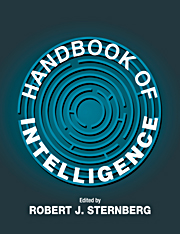Book contents
- Frontmatter
- Contents
- Preface
- Contributors
- PART I THE NATURE OF INTELLIGENCE AND ITS MEASUREMENT
- 1 The Concept of intelligence
- 2 History of Theories and Measurements of intelligence
- 3 Contemporary Models of Intelligence
- PART II DEVELOPMENT OF INTELLIGENCE
- PART III GROUP ANALYSES OF INTELLIGENCE
- PART IV BIOLOGY OF INTELLIGENCE
- PART V INTELLIGENCE AND INFORMATION PROCESSING
- PART VI KINDS OF INTELLIGENCE
- PART VII TESTING AND TEACHING INTELLIGENCE
- PART VIII INTELLIGENCE, SOCIETY, AND CULTURE
- PART IX INTELLIGENCE IN RELATION TO ALLIED CONSTRUCTS
- Author Index
- Subject Index
1 - The Concept of intelligence
Published online by Cambridge University Press: 05 June 2012
- Frontmatter
- Contents
- Preface
- Contributors
- PART I THE NATURE OF INTELLIGENCE AND ITS MEASUREMENT
- 1 The Concept of intelligence
- 2 History of Theories and Measurements of intelligence
- 3 Contemporary Models of Intelligence
- PART II DEVELOPMENT OF INTELLIGENCE
- PART III GROUP ANALYSES OF INTELLIGENCE
- PART IV BIOLOGY OF INTELLIGENCE
- PART V INTELLIGENCE AND INFORMATION PROCESSING
- PART VI KINDS OF INTELLIGENCE
- PART VII TESTING AND TEACHING INTELLIGENCE
- PART VIII INTELLIGENCE, SOCIETY, AND CULTURE
- PART IX INTELLIGENCE IN RELATION TO ALLIED CONSTRUCTS
- Author Index
- Subject Index
Summary
Looked at in one way, everyone knows what intelligence is; looked at in another way, no one does. Put another way, people all have conceptions – which also are called folk theories or implicit theories – of intelligence, but no one knows for certain what it actually is. This chapter addresses how people conceptualize intelligence, whatever it may actually be.
WHY CONCEPTIONS OF INTELLIGENCE MATTER
Why should we even care what people think intelligence is as opposed only to valuing whatever it actually is? There are at least four reasons people's conceptions of intelligence matter.
First, implicit theories of intelligence drive the way in which people perceive and evaluate their own intelligence and that of others. To better understand the judgments people make about their own and others' abilities, it is useful to learn about people's implicit theories. For example, parents' implicit theories of their children's language development will determine at what ages they will be willing to make various corrections in their children's speech. More generally, parents' implicit theories of intelligence will determine at what ages they believe their children are ready to perform various cognitive tasks. Job interviewers will make hiring decisions on the basis of their implicit theories of intelligence. People will decide who to date on the basis of such theories. In sum, knowledge about implicit theories of intelligence is important because this knowledge is so often used by people to make judgments in the course of their everyday lives.
- Type
- Chapter
- Information
- Handbook of Intelligence , pp. 3 - 15Publisher: Cambridge University PressPrint publication year: 2000
- 43
- Cited by



